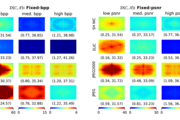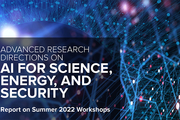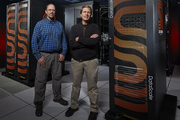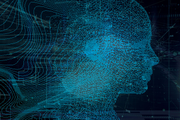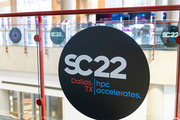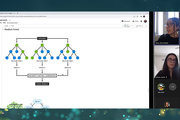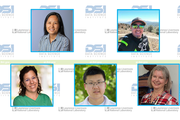Did you know we have a monthly newsletter? View past volumes and subscribe.
Welcome new DSI team members
April 2, 2024 -
When Data Science Institute (DSI) director Brian Giera and deputy director Cindy Gonzales began planning activities for fiscal year 2024 and beyond, they immediately realized that LLNL’s growth in data science and artificial intelligence (AI)/machine learning (ML) research requires corresponding growth in the DSI’s efforts. “Our field is booming,” Giera states. “The Lab has a stake in the...
Machine learning tool fills in the blanks for satellite light curves
Feb. 13, 2024 -
When viewed from Earth, objects in space are seen at a specific brightness, called apparent magnitude. Over time, ground-based telescopes can track a specific object’s change in brightness. This time-dependent magnitude variation is known as an object’s light curve, and can allow astronomers to infer the object’s size, shape, material, location, and more. Monitoring the light curve of...
Conference paper illuminates neural image compression
Dec. 8, 2023 -
An enduring question in machine learning (ML) concerns performance: How do we know if a model produces reliable results? The best models have explainable logic and can withstand data perturbations, but performance analysis tools and datasets that will help researchers meaningfully evaluate these models are scarce. A team from LLNL’s Center for Applied Scientific Computing (CASC) is teasing...
High-performance computing, AI and cognitive simulation helped LLNL conquer fusion ignition
June 21, 2023 -
For hundreds of LLNL scientists on the design, experimental, and modeling and simulation teams behind inertial confinement fusion (ICF) experiments at the National Ignition Facility, the results of the now-famous Dec. 5, 2022, ignition shot didn’t come as a complete surprise. The “crystal ball” that gave them increased pre-shot confidence in a breakthrough involved a combination of detailed...
Visionary report unveils ambitious roadmap to harness the power of AI in scientific discovery
June 12, 2023 -
A new report, the product of a series of workshops held in 2022 under the guidance of the U.S. Department of Energy’s Office of Science and the National Nuclear Security Administration, lays out a comprehensive vision for the Office of Science and NNSA to expand their work in scientific use of AI by building on existing strengths in world-leading high performance computing systems and data...
Consulting service infuses Lab projects with data science expertise
June 5, 2023 -
A key advantage of LLNL’s culture of multidisciplinary teamwork is that domain scientists don’t need to be experts in everything. Physicists, chemists, biologists, materials engineers, climate scientists, computer scientists, and other researchers regularly work alongside specialists in other fields to tackle challenging problems. The rise of Big Data across the Lab has led to a demand for...
Data science meets fusion (VIDEO)
May 30, 2023 -
LLNL’s historic fusion ignition achievement on December 5, 2022, was the first experiment to ever achieve net energy gain from nuclear fusion. However, the experiment’s result was not actually that surprising. A team leveraging data science techniques developed and used a landmark system for teaching artificial intelligence (AI) to incorporate and better account for different variables and...
LLNL and SambaNova Systems announce additional AI hardware to support Lab’s cognitive simulation efforts
May 23, 2023 -
LLNL and SambaNova Systems have announced the addition of a spatial data flow accelerator into the Livermore Computing Center, part of an effort to upgrade the Lab’s CogSim program. LLNL will integrate the new hardware to further investigate CogSim approaches combining AI with high-performance computing—and how deep neural network hardware architectures can accelerate traditional physics...
Cognitive simulation supercharges scientific research
Jan. 10, 2023 -
Computer modeling has been essential to scientific research for more than half a century—since the advent of computers sufficiently powerful to handle modeling’s computational load. Models simulate natural phenomena to aid scientists in understanding their underlying principles. Yet, while the most complex models running on supercomputers may contain millions of lines of code and generate...
Supercomputing’s critical role in the fusion ignition breakthrough
Dec. 21, 2022 -
On December 5th, the research team at LLNL's National Ignition Facility (NIF) achieved a historic win in energy science: for the first time ever, more energy was produced by an artificial fusion reaction than was consumed—3.15 megajoules produced versus 2.05 megajoules in laser energy to cause the reaction. High-performance computing was key to this breakthrough (called ignition), and HPCwire...
LLNL staff returns to Texas-sized Supercomputing Conference
Nov. 23, 2022 -
The 2022 International Conference for High Performance Computing, Networking, Storage, and Analysis (SC22) returned to Dallas as a large contingent of LLNL staff participated in sessions, panels, paper presentations, and workshops centered around HPC. The world’s largest conference of its kind celebrated its highest in-person attendance since the start of the COVID-19 pandemic, with about 11...
LLNL researchers win HPCwire award for applying cognitive simulation to ICF
Nov. 17, 2022 -
The high performance computing publication HPCwire announced LLNL as the winner of its Editor’s Choice award for Best Use of HPC in Energy for applying cognitive simulation (CogSim) methods to inertial confinement fusion (ICF) research. The award was presented at the largest supercomputing conference in the world: the 2022 International Conference for High Performance Computing, Networking...
Understanding the universe with applied statistics (VIDEO)
Nov. 17, 2022 -
In a new video posted to the Lab’s YouTube channel, statistician Amanda Muyskens describes MuyGPs, her team’s innovative and computationally efficient Gaussian Process hyperparameter estimation method for large data. The method has been applied to space-based image classification and released for open-source use in the Python package MuyGPyS. MuyGPs will help astronomers and astrophysicists...
Scientific discovery for stockpile stewardship
Sept. 27, 2022 -
Among the significant scientific discoveries that have helped ensure the reliability of the nation’s nuclear stockpile is the advancement of cognitive simulation. In cognitive simulation, researchers are developing AI/ML algorithms and software to retrain part of this model on the experimental data itself. The result is a model that “knows the best of both worlds,” says Brian Spears, a...
LLNL team claims top AI award at international symbolic regression competition
Aug. 16, 2022 -
An LLNL team claimed a top prize at an inaugural international symbolic regression competition for an artificial intelligence (AI) framework they developed capable of explaining and interpreting real-life COVID-19 data. Hosted by the open source SRBench project at the 2022 Genetic and Evolutionary Computation Conference (GECCO), the competition had two tracks—synthetic and real-world—and...
Lab researchers win top award for machine learning-based approach to ICF experiments
Aug. 4, 2022 -
The IEEE Nuclear and Plasma Sciences Society (NPSS) announced an LLNL team as the winner of its 2022 Transactions on Plasma Science Best Paper Award for their work applying machine learning to inertial confinement fusion (ICF) experiments. In the paper, lead author Kelli Humbird and co-authors propose a novel technique for calibrating ICF experiments by combining machine learning with...
Assured and robust…or bust
June 30, 2022 -
The consequences of a machine learning (ML) error that presents irrelevant advertisements to a group of social media users may seem relatively minor. However, this opacity, combined with the fact that ML systems are nascent and imperfect, makes trusting their accuracy difficult in mission-critical situations, such as recognizing life-or-death risks to military personnel or advancing materials...
Winter hackathon meets WiDS datathon
March 9, 2022 -
Sponsored by the DSI, LLNL’s winter hackathon took place on February 16–17. Hackathons are 24-hour events that encourage collaborative programming and creative problem solving. In addition to traditional hacking, the hackathon included a special datathon competition in anticipation of the Women in Data Science (WiDS) conference on March 7. Hackathon and datathon participants presented their...
Career panel spotlights diversity, equity, and inclusion
Nov. 19, 2021 -
The DSI’s career panel series continued on November 3 with a session highlighting diversity, equity, and inclusion (DEI) as well as the Lab’s DEI-focused employee resource groups (ERGs). ERGs are sponsored by LLNL’s Office of Strategic Diversity and Inclusion Programs.
Moderator Anh Quach, member of the Asian Pacific American Council (APAC), was joined by four panelists: Raul Viera Mercado...
Building confidence in materials modeling using statistics
Oct. 31, 2021 -
LLNL statisticians, computational modelers, and materials scientists have been developing a statistical framework for researchers to better assess the relationship between model uncertainties and experimental data. The Livermore-developed statistical framework is intended to assess sources of uncertainty in strength model input, recommend new experiments to reduce those sources of uncertainty...



